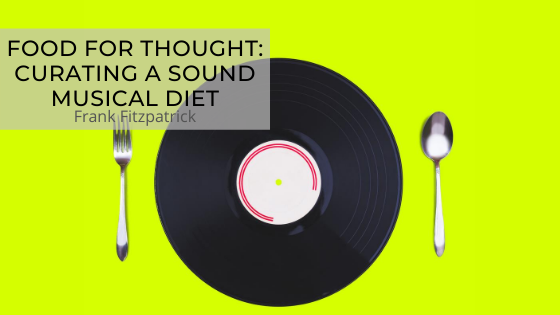Home Frank’s Blog Food For Thought: Curating a Sound Musical Diet
Food For Thought: Curating a Sound Musical Diet
Frank Fitzpatrick 08/20/2020

|
No time to read? Pick your language & press PLAY
Getting your Trinity Audio player ready...
|
“The eye takes a person into the world. The ear brings the world into a human being.” —Lorenze Oken
Music is like a mega-vitamin for the brain. It can increase receptivity and retention of information, aid in cognitive processing, improve the social and emotional development of our children, shift our perceptions and psychological states, and inspire creativity and innovative thinking¹.
Through much of our waking life, we hear a plethora of sounds but are not necessarily listening. Quite often, music is among, if not featured in, the sound collage. If we are not fully present, however, we may not even be aware that our ears are receiving stimuli. Most of us are too busy listening to the imaginary sound of thoughts and voices inside our head.
According to John Medina, molecular biologist and author of Brain Rules, listening to music affects important neurotransmitters in the brain. Listening to music we love triggers the release of dopamine, supporting a range of feelings and activities from pleasure to memory formation. Music can stimulate the release of oxytocin, which affects social bonding and plays an important role in, for instance, building feelings of trust between people, lactation for a nursing mother, having orgasms and giving birth. Listening to meditative or relaxing music can reduce stress levels along with the production of the stress hormone cortisol².
If music is such an omnipotent resource, how do we tap into this wealth of neural activation? And if it has such a profound influence on our thoughts and well-being, wouldn’t we naturally want to be conscious about what we choose to ingest through our ears?
How Music Can Shape Our Perception of the World
To see how much music shapes our beliefs and perceptions even when we aren’t paying attention, simply turn to the world of film soundtracks. Film scoring — the creation of original music to support the narrative and emotional contour of a story — is a craft that has developed over the course of more than 100 years. The aim of the film composer is to shape the subconscious narrative inside the hearts and minds of millions of unknowing viewers. To recognize the critical role music plays in a film, one only need to watch a copy of their favorite film, if available, without music.
In some of my talks and workshops, I help people experience the perception-shaping effect of music by playing a 45-second clip from a scene in a little-known film three times in a row. The scene has no dialogue, so the narrative is told entirely through visuals and an instrumental score. Each time I play the scene — the exact same scene — I change the score. At the end of the exercise, I ask the participants to write a brief synopsis of what they saw in each of the clips. Without fail, they will write a different synopsis for each clip, describing the same character as having different qualities and motives, and summarizing different plots. The music is so powerful in shaping their perceptions that some people will insist I must have changed the visuals. (Watch a clip from my TEDx Talk “The Technologies of Emotion” to witness this exercise in action.)
If music has this much influence over what we think we see on the screen, imagine the way it can shift our experiences or alter the way we perceive the world around us.
Building Your Personal Music Menu
By paying a little more attention to what plays on your radio speakers or through your own headphones, you can be more aware of the unconscious musical programming shaping your inner and outer world. Even when you can’t control the musical selections, like in a movie theater or restaurant, you can still be mindful of the effect music is having on you. Building this awareness will help you recognize what inspires you, what disturbs you, and how much music can affect you and your perceptions and experiences, And when you do have the option to select your musical menu, you then have the ability to tap into a deep source of energy and inspiration by designing the music input for your brain.
Why not choose the musical dishes that support your optimal energy and well-being with the same level of consciousness you apply to your food choices? When you do have control of the airwaves, you can program musical selections that better serve your needs and help you achieve a desired state, whether it be increased focus, relaxation or inspiration to get up and move.
Once you have identified a good musical main course, you can tap deeper into the rich source of nutrients for your brain through a process called active listening. The key to active listening, in this context, is to give your full attention to the musical experience. The more closely you listen, the more you engage the different areas of your brain³. The more you engage, and the more senses you activate, the more strength a piece of music will have in positively affecting your physical, emotional and mental states, especially when you return to that same piece of music later.
Active listening is a great practice for people who find silent meditation challenging and need another way to steady and relax the mind. It is important, of course, that you choose an appropriate piece of music from the endless choices available — one that helps you achieve the desired outcome. For meditation, it is important that you choose music that personally relaxes you. On the other hand, to help incite action you will want to tune in to music that inspires and motivates you.
Once you find that piece of music that helps you achieve your desired state, repeating the exercise daily for two to three weeks will significantly increase the beneficial effects and help you shift to that state more quickly every time you revisit the same musical selection. Your personal playlist can become your toolkit for optimizing your mental and emotional state whenever you need it. One thing to keep in mind is that music preferences are largely subjective. What works for someone else might not create the same outcome for you.
Listening to music in this way — or listening to the interplay of other musicians if you perform or sing in a group — can help you become a more mindful and better listener, not to mention help you become more aware of the seemingly uninterrupted stream of sound data entering your brain. Training your listening skills with the help of music can assist you in multiple areas of your life, from learning languages to deepening the connection in your relationships.
Just like a healthy diet does a body good, being more mindful and intentional about the menu of sounds and music that enters through your ears — the primary gateways to the inner world of your mind — can significantly influence your mental and emotional well-being.
1. Levitin, Daniel J. This Is Your Brain on Music: The Science of a Human Obsession. New York: Plume/Penguin, 2007.
2. Medina, John. Brain Rules: 12 Principles for Surviving and Thriving at Work, Home and School. Seattle: Pear Press, 2014.
3. Cardillo, Joseph, Don DuRousseau and Galina Mindlin. Your Playlist Can Change Your Life: 10 Proven Ways Your Favorite Music Can Revolutionize Your Health, Memory, Organization, Alertness and More. Naperville, Ill.: Sourcebooks, Inc., 2012e.
Want to Learn More?
Choosing the right music is a sure way to amplify our own internal mental and emotional state. Over the next few weeks, I will be presenting a series of articles and free sessions to provide you with scientifically-proven ways to optimize and amplify your energy so you can have all the internal resource you need to navigate the unpredictability and turbulence of the external world with greater CALM, Confidence, and JOY.
To learn more about upcoming programs, books, music, and film releases, Sign up here.
To learn more about working 1-on1 with Frank, go to BeyondPerformance.Life
About the Author
Frank Fitzpatrick is a Creative Executive, Engagement Expert and High-Performance Coach on the Faculty of Singularity University’s Exponential Medicine.
Be sure to check out Frank’s full Bio.
To connect, go to FrankFitzpatrick.com
Join us on Linked-In.
Related Articles
I’m here to help YOU create a better world, inside and out.
Contact Me© 2025 Frank Fitzpatrick Website by AllHereIndia












